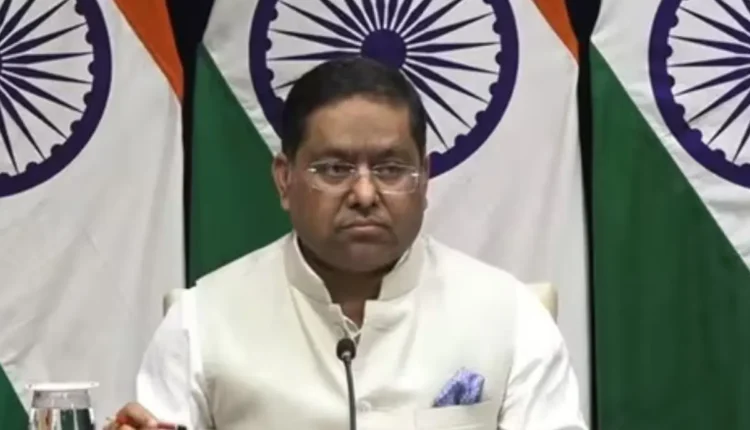Indian Firms Sanctioned by US Didn’t Breach Domestic Laws, India Confirms
India Defends Sanctioned Firms, Affirms No Violation of Domestic Laws
In response to recent US sanctions on 18 Indian firms accused of supplying dual-use goods to Russia, the Indian government has stated that none of these companies violated domestic laws. While upholding its strategic commitment to non-proliferation, India has emphasized that it remains compliant with international frameworks and is actively educating businesses on emerging global export controls.
The Indian firms were part of nearly 400 companies and individuals sanctioned by the US on October 30, 2024. This sweeping action targeted entities in India, China, Kazakhstan, Kyrgyzstan, Malaysia, Switzerland, Thailand, Türkiye, and the UAE, with the US asserting that these entities provided electronic, aviation, and engineering components to Russia in a way that circumvented earlier sanctions.
No Violation of Indian Laws by Sanctioned Companies
According to the Ministry of External Affairs (MEA) spokesperson Randhir Jaiswal, Indian authorities have assessed that the transactions and activities of the sanctioned Indian companies did not breach Indian legal frameworks. Jaiswal stated at a press briefing, “Our understanding is that the sanctioned transactions and companies are not in violation of Indian laws. We are also in touch with US authorities to clarify any outstanding issues.”
To navigate these increasingly complex international trade environments, the Indian government has been conducting outreach sessions for domestic industries, especially those dealing with sensitive exports. Government agencies are focusing on strategic trade and export controls, aiming to ensure Indian firms remain informed about export restrictions that might affect their business with international partners, especially in high-stakes regions.
India’s Strong Non-Proliferation Standards and Compliance
India has underscored its commitment to global non-proliferation standards through membership in key international export control regimes, including the Wassenaar Arrangement, the Australia Group, and the Missile Technology Control Regime (MTCR). Each of these frameworks enforces rigorous standards around the transfer of arms and dual-use technologies, ensuring they are not redirected toward military applications by unauthorized parties.
The Wassenaar Arrangement, for example, promotes transparency in the transfer of conventional arms and dual-use goods. The Australia Group works to prevent the spread of chemical and biological weapons, while the MTCR limits the proliferation of missile technologies. These memberships underscore India’s role as a responsible actor in global trade.
In addition to participating in these international agreements, India also enforces United Nations Security Council resolutions, including Resolution 1540 on non-proliferation. This resolution mandates member states to implement measures preventing the spread of nuclear, chemical, and biological weapons to non-state actors.
Government Outreach to Ensure Compliance with Export Controls
Indian government agencies are currently engaged in outreach initiatives aimed at educating local industries on export controls and their implications. This education extends to emerging export control measures that other countries, like the United States, are enforcing more stringently. By informing Indian companies of these regulations, the government seeks to ensure that they can navigate potential risks without infringing upon India’s own legal and regulatory frameworks.
Jaiswal highlighted this proactive approach, stating that Indian authorities are committed to “sensitizing Indian firms on applicable export control provisions” and briefing them on new international trade measures that could impact their operations. This is particularly critical as international scrutiny of trade with Russia intensifies amid the ongoing conflict with Ukraine.
US Sanctions on International Entities: A Widespread Impact
The US Treasury and State Department recently imposed sanctions on companies and individuals from various countries, accusing them of enabling Russia’s access to dual-use items such as electronic, computer, and aviation components. The US claims that these actions support Russia’s “illegal war” against Ukraine, aiming to stifle Russia’s capacity to circumvent the initial sanctions.
In its statements, the US maintained that these sanctions are intended to “disrupt sanctions evasion and target entities in multiple third countries” that facilitate Russia’s war operations. The sanctioned Indian companies are alleged to have exported thousands of shipments of dual-use goods to Russian entities from 2022 to 2024.
These measures are part of broader efforts by the US to prevent Russia from accessing materials necessary for its defense capabilities, which has prompted sanctions against a range of firms worldwide. However, India is now working with the US to clarify the basis of these allegations and ensure Indian companies are informed and compliant with emerging trade controls.
India’s Strategic Trade and Regulatory Framework
India’s stance reflects its established non-proliferation principles and robust regulatory frameworks governing strategic goods. By staying aligned with multilateral export control regimes and adhering to UN non-proliferation mandates, India reinforces its role as a responsible player on the international stage.
Despite the US sanctions, India continues to assert that its companies and legal frameworks remain compliant with international standards. This balanced approach allows India to navigate its trade relationships strategically without compromising its commitments to non-proliferation.
India’s proactive outreach to industry stakeholders further strengthens this position, ensuring Indian companies are well-prepared to meet global expectations and continue contributing to strategic trade without risking legal infractions. The government’s assurance that no Indian company violated domestic laws underscores its commitment to lawful trade and compliance with international norms, even as it pursues engagement with the US to resolve any potential misunderstandings.
Also Read:Sima Ganwani Ved: Empowering the Future of Retail and Female Leadership

